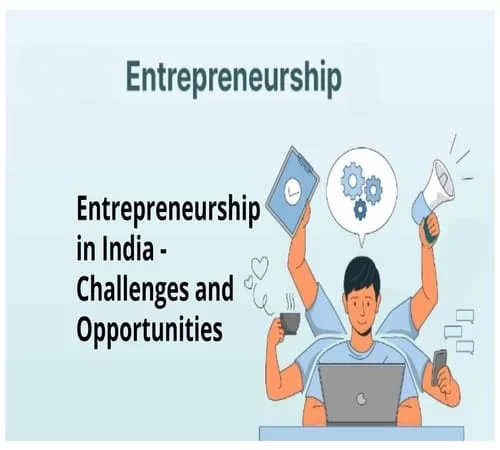

Discover a comprehensive guide providing valuable insights into the intricacies of entrepreneurship in India, offering practical advice on overcoming challenges and seizing opportunities.

Share with social media
India, a land of diversity and contrasts, has emerged as a hotspot for entrepreneurial endeavors in recent years. The vibrant economy, coupled with a burgeoning youth population, presents a fertile ground for innovative business ventures. However, like any other journey, the path of entrepreneurship in India is fraught with challenges and brimming with opportunities.
In this comprehensive guide at PrimeNewsly, we will delve into the nuances of starting and sustaining a business in India, exploring the unique challenges entrepreneurs face and the vast opportunities that await those willing to navigate this dynamic landscape.

Navigating the labyrinthine regulatory landscape can be a formidable challenge for entrepreneurs in India. The bureaucratic red tape, complex tax structures, and the time-consuming process of obtaining licenses can often discourage aspiring business owners. Understanding the regulatory requirements at both the national and state levels is crucial for a smooth start.
Despite a growing interest in startups, access to funding remains a significant obstacle. Traditional financial institutions can be risk-averse, and securing venture capital is not always easy. Entrepreneurs must explore alternative funding options, such as angel investors, crowdfunding, and government schemes, to fuel their ventures.
Infrastructure challenges, including inadequate transportation systems, erratic power supply, and digital connectivity issues, can impede business operations. Entrepreneurs must carefully consider the location of their ventures and assess the infrastructure support available in different regions.
While India boasts a vast pool of talent, there is often a mismatch between the skills possessed by the workforce and the requirements of emerging industries. Entrepreneurs face the challenge of sourcing skilled employees and providing them with the necessary training to meet the demands of a rapidly evolving market.
India's cultural and linguistic diversity can pose communication challenges, both within the workforce and when targeting a customer base. Entrepreneurs need to tailor their marketing and communication strategies to resonate with the diverse cultural backgrounds of their audience.

India's burgeoning middle class presents a vast consumer market hungry for goods and services. Entrepreneurs can tap into this market by identifying unmet needs and tailoring their offerings to suit the evolving aspirations of this demographic.
The rapid digitization of India has opened up unprecedented opportunities for tech-based startups. E-commerce, fin-tech, ed-tech, and health-tech are witnessing exponential growth, creating a fertile ground for entrepreneurs to innovate and disrupt traditional sectors.
The Indian government has launched several initiatives to support entrepreneurship, such as 'Make in India,' 'Startup India,' and 'Digital India.' Entrepreneurs can leverage these programs to access funding, mentorship, and other resources to kick start and scale their ventures.
The interconnected global economy offers Indian entrepreneurs the chance to collaborate with international partners, attracting foreign investment and expanding their market reach. Initiatives like 'Atmanirbhar Bharat' encourage self-reliance while fostering global collaborations.
Addressing social and environmental challenges can be a rewarding avenue for entrepreneurs in India. The growing awareness of sustainability and social responsibility provides an opportunity for businesses to create meaningful impact while also achieving financial success.

Entrepreneurs should conduct thorough market research and develop a robust business plan that takes into account the unique challenges and opportunities in the Indian context. This includes understanding consumer behavior, competition, and potential regulatory roadblocks.
The ability to adapt to changing circumstances and bounce back from setbacks is crucial for entrepreneurial success in India. Entrepreneurs should be prepared to pivot their strategies, embrace new technologies, and learn from failures to stay resilient in the face of challenges.
Networking is a key component of success in the Indian business landscape. Entrepreneurs should actively engage with industry associations, mentorship programs, and local communities to build a support network that can provide guidance and open doors to opportunities.
Embracing technology is not just an opportunity but a necessity for businesses in India. Leveraging digital tools for marketing, operations, and customer engagement can enhance efficiency and provide a competitive edge.
Addressing the skills gap requires a proactive approach to human resource management. Entrepreneurs should invest in training and upskilling their employees to ensure they have the right talent pool to drive business success.
As India continues on its trajectory of growth and transformation, the entrepreneurial spirit remains a driving force, shaping the future of business in this diverse and dynamic country.

1. India's diverse middle class offers entrepreneurs a broad consumer base with varying needs, making market segmentation and targeted solutions paramount for success.
2. The rapid digitization of India has birthed a tech revolution, propelling sectors like e-commerce, fintech, and edtech to unprecedented heights.
3. Navigating India's bureaucratic red tape demands meticulous planning, as entrepreneurs must grapple with complex tax structures and time-consuming licensing processes.
4. Access to funding remains a hurdle for startups, urging entrepreneurs to explore diverse financing avenues such as angel investors, crowd funding, and government initiatives.
5. Entrepreneurs must carefully choose business locations, considering factors like erratic power supply, transportation issues, and digital connectivity challenges that can impact daily operations.
6. Despite a vast talent pool, entrepreneurs often face a gap between workforce skills and industry requirements, necessitating strategic hiring and continuous employee training.
7. India's rich cultural diversity poses communication challenges, urging entrepreneurs to tailor marketing strategies that resonate across a spectrum of linguistic and cultural backgrounds.
8. Initiatives like 'Startup India' and 'Make in India' provide a lifeline for entrepreneurs, offering access to funding, mentorship, and resources to kickstart and scale their ventures.
9. The interconnected global economy opens avenues for collaboration, encouraging entrepreneurs to attract foreign investment and expand market reach through initiatives like 'Atmanirbhar Bharat.'
10. Addressing societal and environmental challenges presents a dual opportunity for entrepreneurs, allowing them to create meaningful impact while also achieving financial success.
11. Building a strong network through industry associations, mentorship programs, and community engagement is pivotal for entrepreneurs seeking guidance and opportunities in the Indian business landscape.
12. Embracing technology is not just an option but a necessity, offering entrepreneurs a competitive edge by enhancing efficiency in marketing, operations, and customer engagement.
ALSO READ: ![]() Jio's 90 days Plan, 20GB Data Extra with budget Price, Know details
Jio's 90 days Plan, 20GB Data Extra with budget Price, Know details
Entrepreneurs in India face regulatory hurdles like complex tax structures and time-consuming licensing processes. Navigating bureaucratic red tape requires meticulous planning.
Startups can explore diverse funding avenues; including angel investors, crowd funding, and government initiatives like 'Startup India' to secure the capital needed for growth.
India's rich cultural diversity poses communication challenges. Entrepreneurs must tailor marketing strategies to resonate across various linguistic and cultural backgrounds to ensure effective engagement.
Initiatives like 'Make in India' and 'Startup India' provide crucial support to entrepreneurs by offering access to funding, mentorship, and resources to kickstart and scale their ventures.
Entrepreneurs can attract foreign investment and expand market reach by participating in global collaborations, aligning with initiatives like 'Atmanirbhar Bharat' that encourage self-reliance alongside international partnerships.
Jio's 90 days Plan: Reliance Jio has made a big change in its recharge portfolio. Despite Jio's recharge plans being expensive; there are still some plans that offer great offers at affordable prices. The plan offers 20GB of additional data along with unlimited voice calls.
749 jio plan details and Benefits: Reliance Jio is offering several recharge plans for its prepaid customers. Jio's affordable new prepaid plan is a bundle pack of offers. It offers unlimited data and free calling. Reliance Jio is offering 20GB additional data to its subscribers.
Chaitra Purnima 2024 and Hanuman Jayanti: The first full moon of the Hindu New Year will be celebrated tomorrow. It is called Chaitra Purnima. On this auspicious day, Lord Ganesha and Goddess Lakshmi are worshipped. The festival of Hanuman Jayanti is also celebrated on full moon day during Navratri.
Fan Speed Tips for summer: You first need to know why the speed of the fan goes low in summer. We further explain you that the speed of the fan is low in summer for two reasons. If you know this, half of your problem will be solved.



